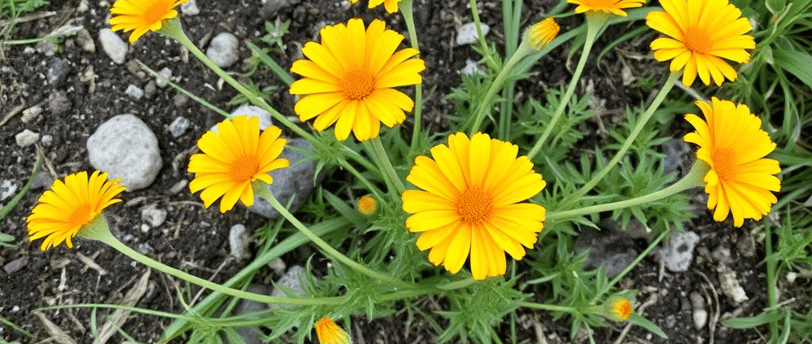The Health Benefits of Calendula: A Comprehensive Guide
HERBAL INSIGHTS


Calendula, also known as pot marigold (Calendula officinalis), is a vibrant flowering plant that has been celebrated for centuries for its medicinal and culinary uses. Whether it’s infused into herbal salves, teas, or culinary recipes, calendula is revered for its skin-soothing, anti-inflammatory, and healing properties. In this article, we’ll explore the health benefits of calendula, the forms available on the market, its common symptoms and causes for use, dosage recommendations, potential side effects, and precautions. We’ll also highlight how to use calendula and present scientific evidence to emphasize the plant's therapeutic applications.
Forms Available
Calendula is a versatile herb that is available in various forms for health and wellness purposes. The most common ones include:
Calendula Oil: Extracted from the flower and used topically for skin healing and hydration.
Dried Calendula Flowers: Often used to brew teas or as a natural ingredient in homemade salves and recipes.
Calendula Creams and Ointments: Frequently used to treat minor burns, rashes, and other skin irritations.
Supplements: Available as capsules or tinctures for internal use, though consultation with a healthcare provider is recommended.
Calendula Extract: Found in skincare products, serums, and natural remedies.
Calendula Tea: A calming herbal tea made using dried flowers.
Common Symptoms Calendula Helps Address and Causes
Calendula is widely known for its ability to relieve various ailments. Here are some of the common conditions individuals use calendula to alleviate, along with the contributing causes:
Inflammation: Calendula is rich in anti-inflammatory compounds that are helpful in reducing swelling and redness caused by injuries, infections, or chronic conditions.
Wound Healing: Thanks to its antimicrobial and astringent properties, calendula helps speed up wound recovery by reducing bacterial growth.
Skin Troubles: Whether for eczema, psoriasis, acne, or sunburn, calendula's soothing properties offer relief for a remarkably wide range of skin conditions.
Gastrointestinal Issues: Calendula tea is sometimes used for digestive discomfort, such as ulcers or gastritis, because of its calming effect on the GI tract.
Throat Infections and Oral Health: Gargling with calendula tea may alleviate sore throat symptoms or reduce gum inflammation.
Recipes and How to Use Calendula
Adding calendula to your daily wellness regimen is simple, whether you choose to ingest it or apply it topically. Here are a few easy ways to incorporate calendula into your lifestyle:
Calendula Tea
Recipe:
Ingredients: 1-2 teaspoons of dried calendula flowers, 1 cup of boiling water, honey (optional)
Instructions: Add the dried flowers to the boiling water and steep for 10 minutes. Strain the tea and enjoy warm. You can add honey for sweetness.How to Use: Drink 1-2 cups daily to promote digestive health, reduce inflammation, and support immune function.
Calendula Salve
Recipe:
Ingredients: 1 cup of calendula-infused oil, 1/4 cup beeswax pellets
Instructions: Heat the ingredients in a double boiler until the beeswax melts. Pour into jars and let solidify.How to Use: Apply to cuts, scrapes, or dry skin to promote healing and hydration.
Calendula-Infused Oil for Cooking
Instructions: Add dried calendula flowers to olive oil and let it infuse for two weeks in a cool, dark place. Strain and use the oil in salad dressings, marinades, or other recipes.
Dosage
The appropriate dosage of calendula depends on how it is used and the health condition being treated. Below are general guidelines:
Calendula Tea: 1-2 cups per day.
Calendula Extract/Tincture: 1-2 ml (28-56 drops) daily as directed by the product label or your healthcare provider.
Topical Applications: Use calendula ointments, oils, or creams as needed on the affected area.
Important: Always consult a healthcare professional before taking calendula internally, especially if you are pregnant, breastfeeding, or on other medications.
Side Effects and Precautions
Although calendula is generally considered safe when used as directed, there are some precautions to be aware of:
Allergic Reactions: People allergic to plants in the Asteraceae family (like daisies and ragweed) may also be allergic to calendula.
Pregnancy and Breastfeeding: Internal use of calendula is not recommended as it may interfere with pregnancy or lactation.
Medication Interference: Calendula could potentially interact with sedative medications or cause drowsiness.
Skin Sensitivity: For those with sensitive skin, it’s recommended to do a patch test before using calendula topically.
If you experience any side effects such as itching, redness, or digestive discomfort, discontinue use and consult a doctor.
Scientific Evidences
The medicinal properties of calendula have been extensively studied by researchers. Various studies highlight its efficacy:
Anti-Inflammatory Properties: Research published in the Journal of Basic and Clinical Physiology and Pharmacology demonstrated calendula’s ability to reduce inflammation and edema in animal models.
Antimicrobial Effects: Calendula was found to inhibit the growth of bacteria like Staphylococcus aureus and Escherichia coli in a study published in Pharmaceutical Biology.
Wound Healing Benefits: A study from BMC Complementary Medicine and Therapies showed that calendula topical treatments significantly accelerated wound closure and tissue regeneration.
These studies affirm calendula's value as a natural remedy for inflammation, infection, and skin health.
Conclusion
Calendula is a powerful natural remedy with a variety of health benefits, from soothing skin irritations to improving digestive and oral health. Available in a range of forms like teas, oils, and ointments, it is a versatile herb that can be easily incorporated into daily wellness practices. However, it’s important to use calendula responsibly, taking into account proper dosages, potential side effects, and necessary precautions. Backed by scientific evidence, calendula continues to thrive as a trusted herbal solution, offering healing and nourishment for both body and mind.
Reference: For additional insights, consult peer-reviewed articles and reliable herbal medicine resources to confirm calendula's efficacy and uses.
